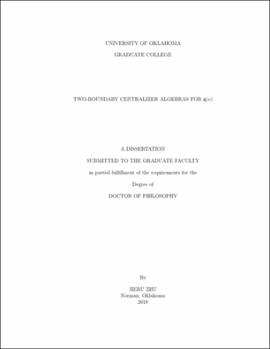| dc.contributor.advisor | Kujawa, Jonathan | |
| dc.contributor.author | Zhu, Jieru | |
| dc.date.accessioned | 2018-07-20T18:20:51Z | |
| dc.date.available | 2018-07-20T18:20:51Z | |
| dc.date.issued | 2018-08 | |
| dc.identifier.uri | https://hdl.handle.net/11244/301299 | |
| dc.description.abstract | We define the degenerate two boundary affine Hecke-Clifford algebra $\mathcal{H}_d$, and show it admits a well-defined $\mathfrak{q}(n)$-linear action on the tensor space $M\otimes N\otimes V^{\otimes d}$, where $V$ is the natural module for $\mathfrak{q}(n)$, and $M, N$ are arbitrary modules for $\mathfrak{q}(n)$, the Lie superalgebra of Type Q. When $M$ and $N$ are irreducible highest weight modules parametrized by a staircase partition and a single row, respectively, this action factors through a quotient of $\mathcal{H}_d$. Our second goal is to directly construct modules for this quotient, $\mathcal{H}^p_d$, using combinatorial tools such as shifted tableaux and the Bratteli graph. These modules belong to a family of modules which we call calibrated. Using the relations in $\mathcal{H}^p_d$, we also classifiy a specific class of calibrated modules. This result provides connection to a Schur-Weyl type duality: the irreducible summands of $M\otimes N\otimes V^{\otimes d}$ coincide with the combinatorial construction. | en_US |
| dc.language | en_US | en_US |
| dc.subject | representation theory | en_US |
| dc.title | Two-boundary centralizer algebras for q(n) | en_US |
| dc.contributor.committeeMember | Roche, Alan | |
| dc.contributor.committeeMember | Lifschitz, Lucy | |
| dc.contributor.committeeMember | Forester, Max | |
| dc.contributor.committeeMember | Abraham, Eric | |
| dc.date.manuscript | 2018 | |
| dc.thesis.degree | Ph.D. | en_US |
| ou.group | College of Arts and Sciences::Department of Mathematics | en_US |
